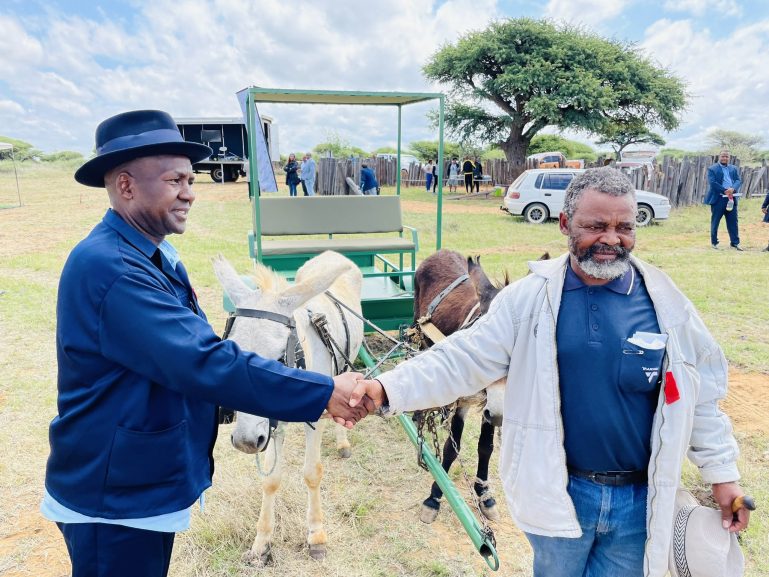Controversy continues to thrive in a tale of donkeys and carts in the North West province. This is after the Department of Community Safety and Transport spent R780 000 on 20 donkey carts to donate to residents of Dibono and Manawana Villages near Mahikeng.
This drew mixed reactions from different stakeholders about the feasibility of the project.
The intervention has raised questions about why the department did not invest in critical infrastructure and public transport.
🧵 Media Statement
Friday, 04 November 2022
MEC Lehari handed over animal drawn carts to rural villagers
Twenty households from Dibono and Manawana villages outside Mahikeng have for the first time benefited from the non-motorised programme. pic.twitter.com/7Tgh78YSmr
— NWPGCommSafety (@NWPGCommSafety) November 4, 2022
Donkey carts on bumpy roads, a controversial move the department calls an intervention to provide transport for the community. This came as a shock to many.
Countries outside are now talking about 4IR, we are talking about donkey carts. We are at a point where the department, not even once, spoke on the rural development strategy that they are having. So going to donate donkeys for us as the Democratic Alliance is actually saying to us that you are fine with communities being primitive. You have no plans to take them forward and develop them,” says the DA’s Freddy Sonakile.
The Economic Freedom Fighters questioned the exorbitant amount spent on the carts and have said they will open a case against the department for alleged fraud.
“There is not even a single donkey cart that can cost R32 000. It’s like it’s propelled by an engine or maybe there is a fridge or sofa. So it’s only eating money. But as the EFF, we are going to follow this up and then we are going to make sure that a case is registered and really, hell is going to break loose,” says EFF’s Lebogang Xaba.
Newsflash: Monday, 07 Nov 2022. Chief Director for Transport Operations Mme Mmaserame Dayel says the distribution of animal-drawn carts is in line with the national Rural Transport Strategy. This after MEC Lehari handed the carts to 20 beneficiaries of Dibono & Manawana villages pic.twitter.com/q09ZFZjCky
— NWPGCommSafety (@NWPGCommSafety) November 7, 2022
In rural Manawana, and dusty Dibono, where roads are a muddy mess, beneficiaries sing a different tune.
“We’ve been struggling to walk all the way to the stop at the tarred road on foot. Now, this cart can take you all the way to the stop and when you come back from Mahikeng, it will take you back home. I think these carts have brought progress. Now no one will carry water on their heads because they can use these carts,” says resident Kereditse Monyadiwa.
Another resident, Neo van Wyk echoes similar sentiments, “We’ve been struggling to get to the clinic on foot and our clinic is all the way in Masutlhe. Sometimes our children can’t get to school because the buses get stuck there. Now I’m able to take them to school with this cart.”
While this development came as a surprise, some community members could argue why in this day and age donkey-drawn carts could be provided by the government and still be used as a mode of transport. Questions about the maintenance of roads were raised.
Newsflash: Monday, 07 Nov 2022. Chief Director for Transport Operations Mme Mmaserame Dayel says the distribution of animal-drawn carts is in line with the national Rural Transport Strategy. This after MEC Lehari handed the carts to 20 beneficiaries of Dibono & Manawana villages pic.twitter.com/q09ZFZjCky
— NWPGCommSafety (@NWPGCommSafety) November 7, 2022
However, according to the provincial government provision of animal-drawn carts to rural communities is in line with the National Land Transport Act.
“Animal-drawn carts were identified as one of the intervention areas to improve access to health care, education, social services and economic opportunities in rural areas. As part of the contract with the department, the service provider will maintain and fix the carts for the next three years at no cost to the owners.”
“The 20 carts were procured for a total of R780 000 inclusive of the three-year maintenance plan. The two-seater is R32 500 each and the four-seater is R45 000 each,” says North West Community Safety and Transport Management MEC, Sello Lahari.


